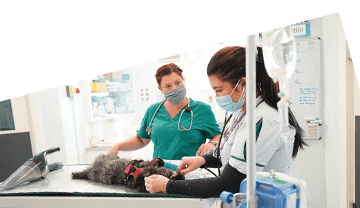
Caring for your dog
The Rowan Vets team are here to help you take excellent care of your dog. Our experienced dog Vets will provide tailored care for your dog through every milestone and have many years’ experience treating illness and injury. They can also advise you on the best combination of preventative health care treatments for your canine companion.
For practical home-care advice, monitoring of your dog’s weight, and senior dog care, you can come and talk to our Registered Veterinary Nurses too.
Book an appointment for your dog
Is your new pet a puppy? We have specific information about your puppy’s needs here >
Visiting our practice with your dog
At Rowan Vets, our team love greeting you and your dog when you visit. We understand that visiting the vets isn’t always exciting for nervous dogs, and this can affect their behaviour and wellbeing. We want all pets to have a stress-free visit, which is why we are advocates of Fear Free® – learn more.
Preventative healthcare for dogs
Dogs are generally out and about every day and likely to be mixing with other dogs on their adventures. This is why it’s so important to protect your dog and others from the spread of infectious diseases. Most life-threatening canine infectious diseases are preventable through vaccinations, which should be boosted every year.
Contagious Canine Cough, more commonly known as Kennel Cough, is another infectious disease and although not life-threatening in the vast majority of cases, it will leave your dog feeling very unwell, and it is highly contagious. Plus, kennel cough can be picked up from anywhere, not just kennels.
Learn more about dog vaccinations.
Neutering is also important if you are not planning to breed from your dog. Our dog Vets can talk to you about when to neuter your puppy or adult dog, as well as the many health and behavioural benefits.
Our Vets can also advise you on the best combination of preventative healthcare treatments to protect your dog from fleas, worms, and ticks. Did you know you can save money on dog vaccinations and flea & worm control with out Pet Health Club?
Other services we offer for dogs include:
- Microchipping
- Neutering
- Weight & diet clinics
- Senior dog clinics
- Dental care
- Pain clinics
- Cardiology
- and many more…
We’ve also created a range of helpful dog factsheets
Choosing a puppy or an adult dog
Owning a dog is a life-long commitment. Many dogs now live beyond their 10th birthday so it is important that you seriously consider, before you buy a puppy, whether you have the time and financial stability in place to care for a dog. The commitment from you will hopefully turn your new pet into a relaxed, loving member of the family, and a well-mannered member of your community.
The first thing to consider is whether to adopt a dog or get a puppy from a breeder.
Why adopt a rescue dog
- There are an increasing number of dogs in rescue centres all waiting for a new home.
- These are often older dogs who already have a basic grasp of training.
- You also have the benefit of being able to see what characteristics the dog will have as an adult and whether this behaviour is suited to your household.
Pros & cons of getting a puppy from a breeder
Getting a puppy from a breeder comes with all the delights (and hardships) of owning a very young, often very dependent puppy. This requires a dedicated owner, as housetraining will have to be taught and the puppy cannot be expected to be left alone for long periods of time.
If you were to choose a puppy from a litter, there are some things to bear in mind:
- Pedigree breeds are more predisposed to health conditions than mongrels.
- Certain breeds are renowned for suffering from different diseases.
Talk to one of our Vets if you want advice on these points.
Once you have decided which breed you would like, now you will have to decide which puppy:
- It is a sign of a good breeder if they are happy to show you both parents when you come to view the litter – consider the reasons why some breeders may not want you to see the parents.
- A healthy puppy should be inquisitive, interested in new people and situations and at less than 10 weeks, shouldn’t be too shy.
- They should be an average weight compared to their litter mates, and have no signs of coughing or sneezing.
- The shy, underweight puppy in the corner is much more likely to grow into a nervous (and potentially aggressive) older dog than the confident happy puppy who is eager to greet you when they first see you.
Learn about the care a new puppy will need



